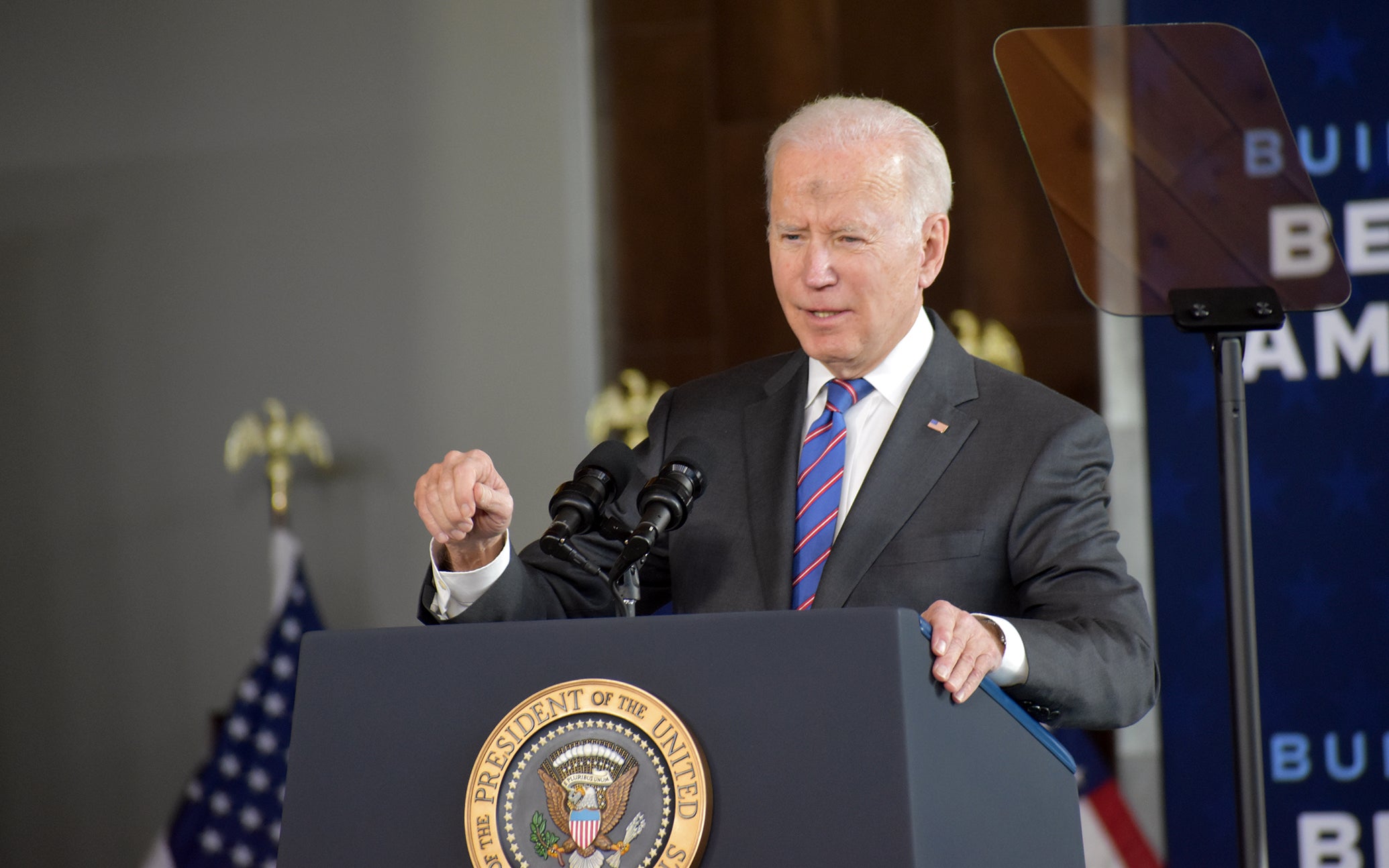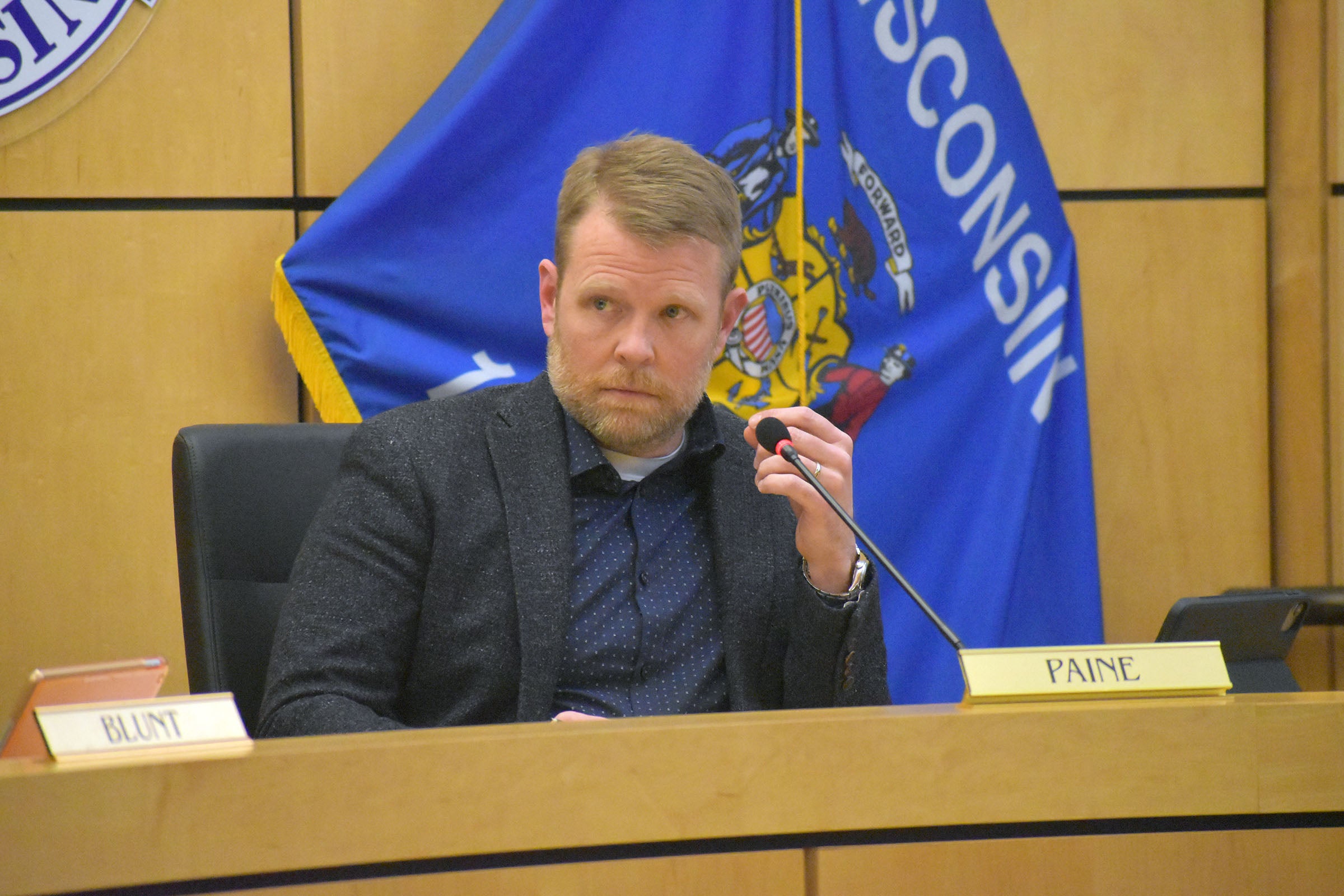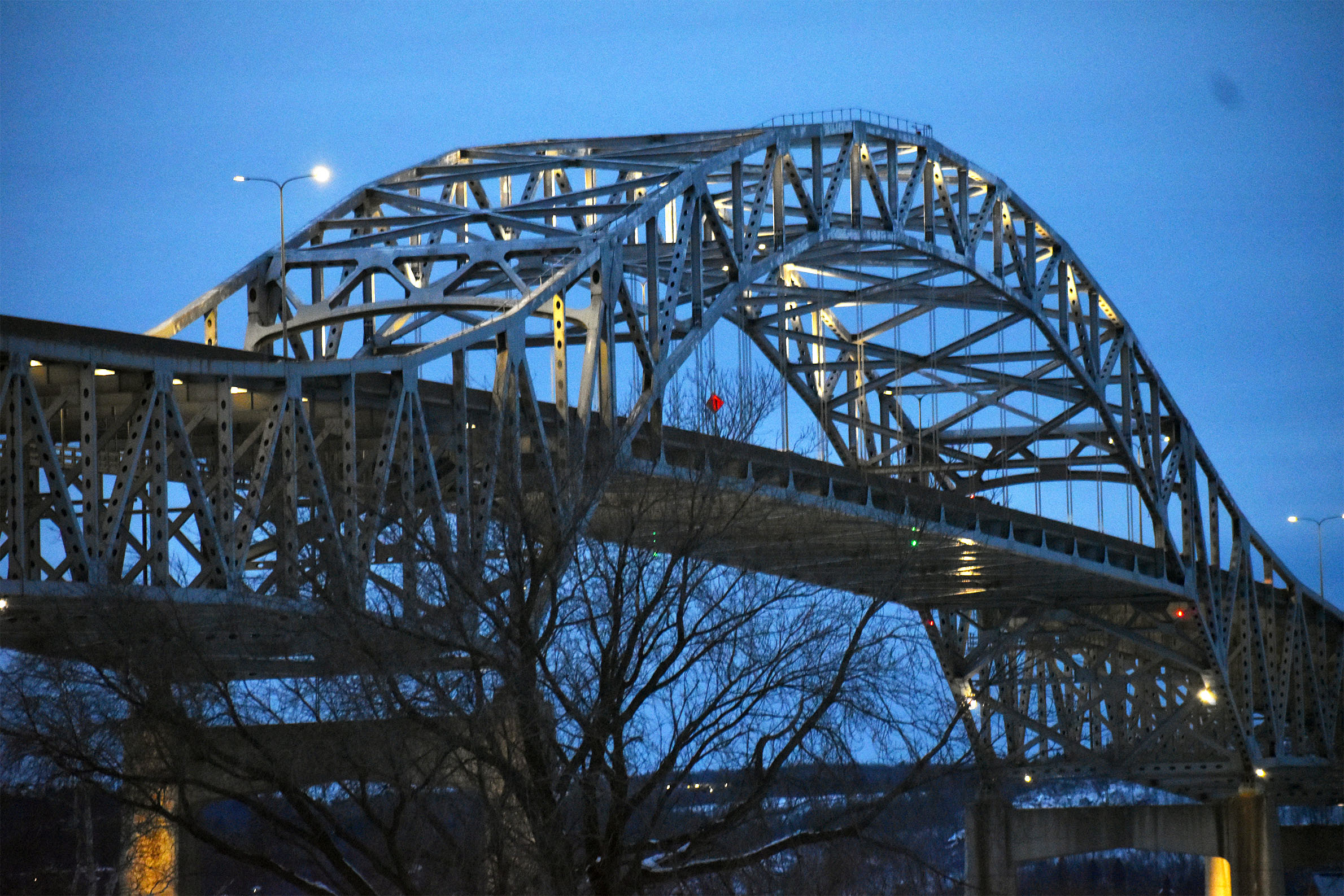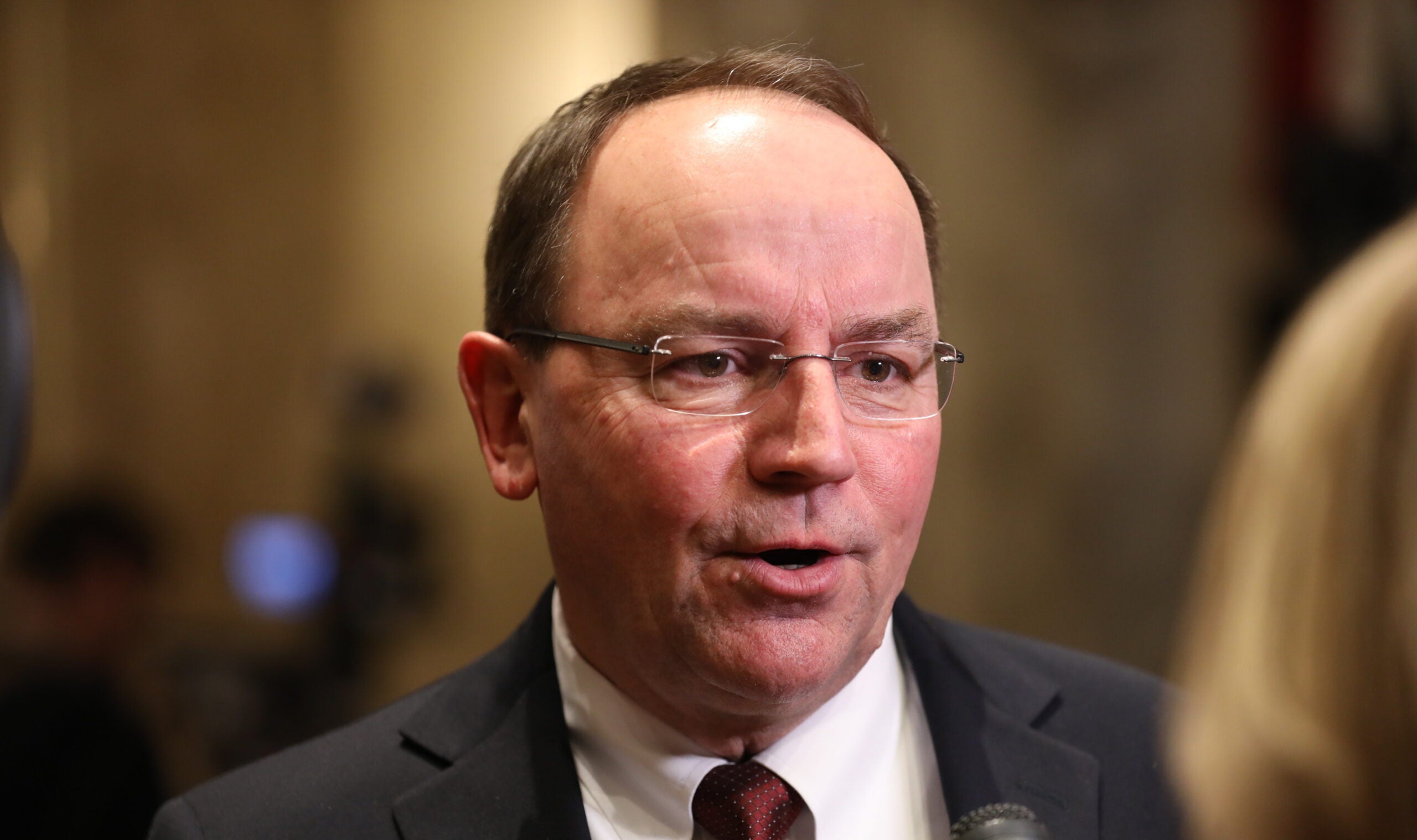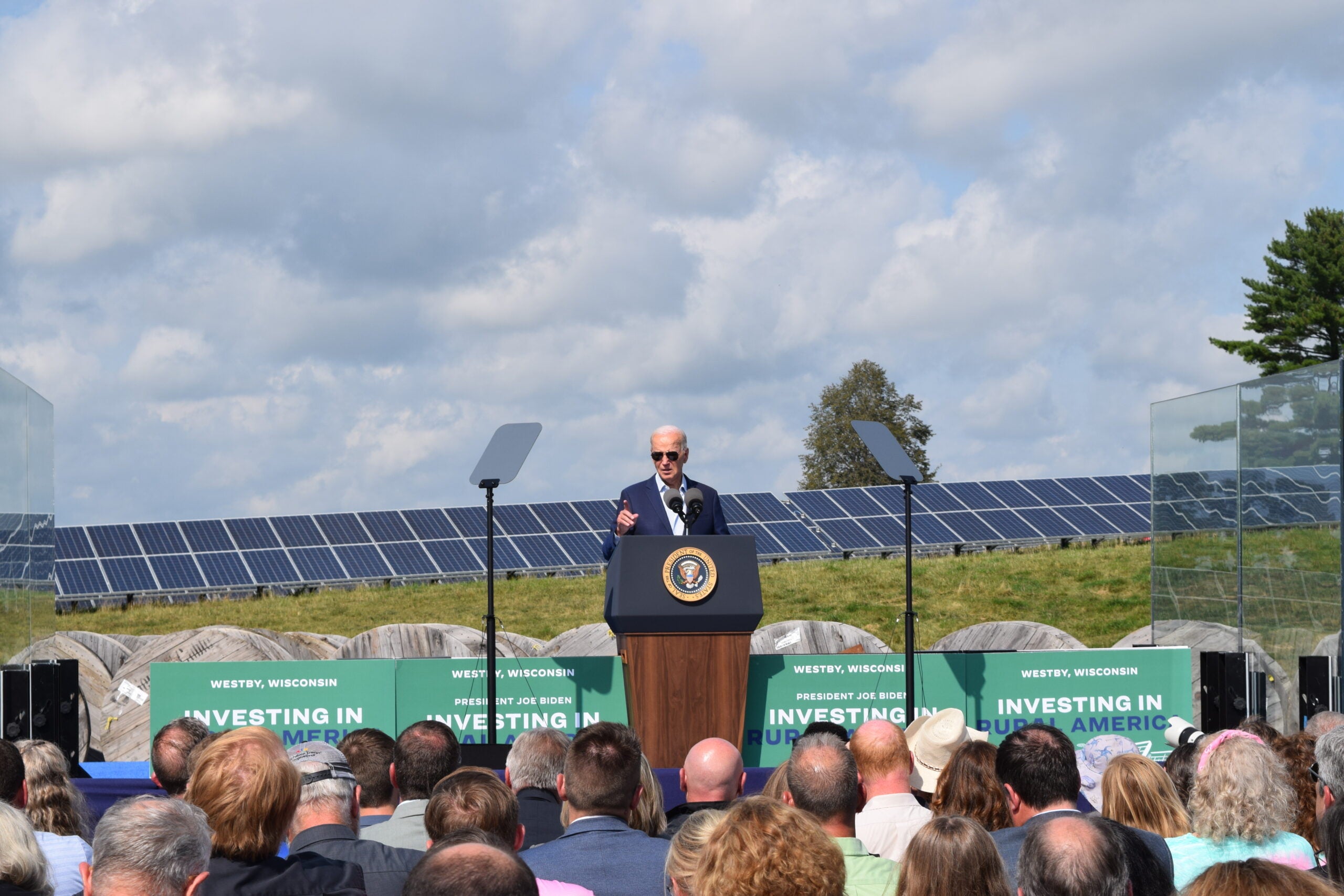President Joe Biden stopped in Superior Wednesday to promote the $1 trillion bipartisan infrastructure law, the nation’s largest investment in decades to repair aging bridges and roads.
Biden flew to the far northern Wisconsin city a day after he delivered his State of the Union address to Congress on Tuesday. During his speech, the president announced the nation would begin fixing 65,000 miles of highway and 1,500 bridges this year and create millions of jobs modernizing the nation’s infrastructure.
Biden said the funding will help update the 61-year-old Blatnik Bridge that connects Superior to Duluth, Minnesota, across the St. Louis River.
Stay informed on the latest news
Sign up for WPR’s email newsletter.
“Your governor is going to use some of that funding for this law to modernize one of the most important bridges in this region,” Biden said.
Prior to Biden’s visit, local leaders and labor officials said they were eyeing infrastructure funds to replace the bridge, which is expected to cost $1.8 billion. Wisconsin and Minnesota transportation officials hope federal funding will pay for most of the project as they split the cost of its replacement. Construction is set to begin in 2028.
Democratic Gov. Tony Evers said the bridge is one of only two connections between Duluth and Superior that is nearing the end of its useful life. Without additional funding, he said the bridge will continue to deteriorate.
“This is a once in a generation investment, folks, and we are hoping to put that investment to good use with projects like reconstructing the Blatnik Bridge,” said Evers.
Evers said the bipartisan infrastructure law will provide at least $225 million each to Wisconsin and Minnesota for bridge replacement and rehabilitation projects. Transportation officials in the two states also plan to compete for $12.5 billion made available under the law through the Bridge Investment Program.
Wisconsin is expected to receive more than $5 billion for roads and bridges under the infrastructure law over the next five years. That’s an increase of roughly $1 billion from what the state usually receives.
Local leaders and lawmakers also welcomed funding for roads, water and broadband infrastructure in addition to $1 billion set aside to clean up polluted hotspots on the Great Lakes, including the St. Louis River.
“After decades of decline, we are rebuilding this city … building roads and bridges,” Superior Mayor Jim Paine said. “We’re building the most innovative broadband network, and we are cleaning the greatest of the Great Lakes, all with the bipartisan infrastructure bill that President Biden and this Congress managed to deliver to cities like Superior all across the country.”
Biden’s legislative victory includes $550 billion in new spending over five years.
The infrastructure law devotes $110 billion for roads and bridges, $65 billion for broadband internet and $55 billion to address the nation’s deteriorating water infrastructure and eliminate lead pipes.
Vice President Kamala Harris visited Milwaukee in January to push a plan to speed up removal of lead pipes in the next decade. Wisconsin is set to receive more than $48 million this year to replace lead pipes.
Biden said investing in the nation’s infrastructure would create millions of jobs by modernizing the nation’s roads, airports, ports and waterways.
“We’ll do it all to withstand the devastating effects of climate and to promote environmental justice in the process,” said Biden.
Despite consensus on infrastructure, Republican lawmakers have criticized Biden’s handling of the pandemic, economic recovery and Russia’s war with Ukraine that has led to increased energy prices and growing concerns around inflation.
In a press call Wednesday about Biden’s visit, U.S. Rep. Tom Tiffany, R-Hazelhurst, blamed Biden for Russian President Vladimir Putin’s invasion of Ukraine, saying Biden’s “weakness” led to war. He said Biden administration policies like the president’s decision to shut down the Keystone XL pipeline emboldened Putin and affected energy prices.
Tiffany said the nation needs more investment in fossil fuel infrastructure that includes the rebuild of Wisconsin’s only oil refinery in Superior that was damaged in a 2018 explosion, which caused a temporary evacuation of city residents.
The Republican Party of Wisconsin has said Biden should commit to maintaining Enbridge’s Line 5 as part of investments in the nation’s infrastructure. Protesters gathered outside the Yellowjacket Union on Wednesday demanding the president shut down the oil and gas pipeline in line with his climate agenda.
Michigan’s governor, tribal nations and environmental groups have made similar demands at the line’s crossing in the Great Lakes. The White House has previously said it has no plans to shut down the aging pipeline.
Additional sanctions announced against Russia and its allies
Biden’s visit to Superior comes as Russian military forces have escalated attacks on Ukraine. The White House announced additional sanctions against Russia and its ally Belarus on Wednesday. Those actions include sanctions that target Russia’s defense sector and place export controls on oil and gas equipment that supports Russia’s refining capacity.
The State Department will impose sanctions on 22 Russian defense entities that include manufacturers of combat aircraft, infantry vehicles, electronic warfare systems, missiles and unmanned aerial vehicles for Russia’s military.
The Commerce Department will also target entities that have supported Russian and Belarusian security services and defense research and development.
The new sanctions are in addition to financial penalties issued this week that seek to isolate Putin and weaken the country’s economy.
Wisconsin Public Radio, © Copyright 2025, Board of Regents of the University of Wisconsin System and Wisconsin Educational Communications Board.
